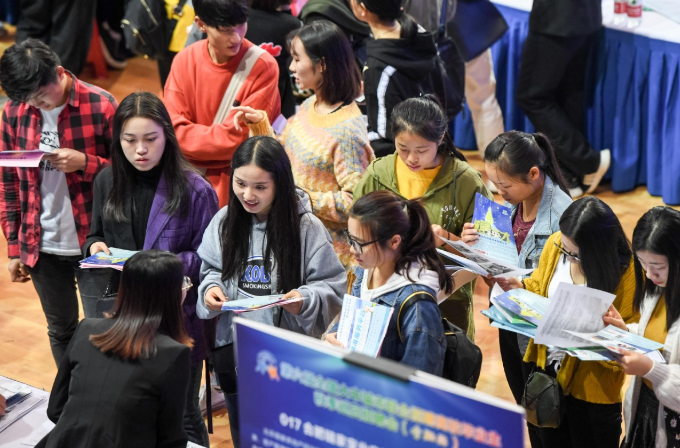


Job seekers speak with recruiters at Hefei University in Hefei, Anhui province, at a job fair for college graduates. (Xinhua Photo)
Entering 2019, a "talent war", which has been prevalent the past two years, has once again escalated in China's second-tier cities.
Nanjing in east China’s Jiangsu Province announced on Feb. 27 that it would continue to implement a one-year trial settlement program for those with a bachelor's degree or above as well as those with technical skills, which originally began on March 1, 2018.
Aside from Nanjing, many other cities have continued to expand their talent policies this year. Statistics show that as of March 1, more than 20 cities had issued various policies regarding talent introduction and settlement.
The reform of China's household registration system means people can now be "fast-tracked" as the educational requirements for permanent residence registration have been lowered, while restrictions on registration through property purchases, investment and tax payments have also been relaxed.
The bid to attract talents has become a new form of urban competition. Emerging second-tier cities, such as Xi 'an in Shaanxi Province and Zhengzhou in Henan Province have almost exerted themselves in efforts to gain skilled workers. To some extent, the "war for talents" has changed from grabbing talents to grabbing population. Cities are also offering "real money" in the form of subsidies for the costs associated with renting, buying and living, to attract more people.
In addition to granting rent and trainee subsidies for college graduates, Nanjing has increased its talent housing welfare from 1,000 yuan per month to 2,000 yuan. Shenyang in northeast China’s Liaoning Province has also started to provide rent subsidies for college graduates. The standard is 800 yuan per month for those holding a doctor’s degree, 400 yuan for a master’s, and 200 yuan for a bachelor’s.
This year, Dalian abolished the rule that no mortgage or transfer is allowed within three years on a house where a talent's hukou is registered, and halved the standard time of participating in social insurance from one year to six months.
Xi'an abolished the requirement of social insurance for the purchase and settlement of houses, so that property acquisition was no longer subject to the limitations of social insurance, purchase time and area.
Nanjing also revised the integral settlement of houses. The new measures stipulate that the real estate area should be scored 1 point per square meter towards a person's hukou, and social security should be changed from "continuous payment within two years" to "cumulative payment of social security not less than 24 months".
Some analysts believe that second-tier cities, represented by provincial capitals, are attracting more talents than ever this year, reflecting a "talent anxiety" in terms of economic and social development. It is precisely this development anxiety that pushes second-tier cities' desire to progress in short-term economic growth and fiscal revenue growth through new talent policies.
Different cities also have different demands for talents. Compared with first-tier cities, second-tier cities are comparatively uncompetitive in attracting high-end talents. Nanjing is a second-tier city that joined the "talent war" early on. However, although Nanjing is rich in science and education resources and has a large number of researchers in both sectors, there is a shortage of talents in industrial development and innovation. Nanjing also lacks top-notch scientists who can stand on the scientific world stage.
In central and western regions, however, some previously negative factors have now turned into advantages, such as lower land prices and labor costs than in big coastal cities. Under the high cost of large coastal cities, talented individuals may choose to stay in the central and western regions for employment. First choices are the strong provincial capitals in the west and central regions, such as Zhengzhou, Wuhan, and Chengdu.
However, the population growth brought about by the relaxed settlement policy has caused housing prices in many cities to increase rapidly. As more cities follow suit, the new talent policy is also facing controversy as to whether it is to attract talent or stimulate the property market.
Compared with first-tier cities, which strictly control population and restrict purchase, second-tier and third-tier cities are facing a development opportunity, and the urban population in both will increase rapidly. However, at present, the talent policy of most cities in China only considers attracting people by lowering the threshold to introduce talents, but have not created measures to retain them once they arrive.
Under the new talent policy, it is difficult for people without industry experience to move, and the increasing population will become a burden on the city. Therefore, the support of an industrial base is vital. A good industrial base can form the effect of talent gathering. The role of talents in cities should be reflected in promoting industrial development and upgrading, not in stimulating real estate.

 Award-winning photos show poverty reduction achievements in NE China's Jilin province
Award-winning photos show poverty reduction achievements in NE China's Jilin province People dance to greet advent of New Year in Ameiqituo Town, Guizhou
People dance to greet advent of New Year in Ameiqituo Town, Guizhou Fire brigade in Shanghai holds group wedding
Fire brigade in Shanghai holds group wedding Tourists enjoy ice sculptures in Datan Town, north China
Tourists enjoy ice sculptures in Datan Town, north China Sunset scenery of Dayan Pagoda in Xi'an
Sunset scenery of Dayan Pagoda in Xi'an Tourists have fun at scenic spot in Nanlong Town, NW China
Tourists have fun at scenic spot in Nanlong Town, NW China Harbin attracts tourists by making best use of ice in winter
Harbin attracts tourists by making best use of ice in winter In pics: FIS Alpine Ski Women's World Cup Slalom
In pics: FIS Alpine Ski Women's World Cup Slalom Black-necked cranes rest at reservoir in Lhunzhub County, Lhasa
Black-necked cranes rest at reservoir in Lhunzhub County, Lhasa China's FAST telescope will be available to foreign scientists in April
China's FAST telescope will be available to foreign scientists in April